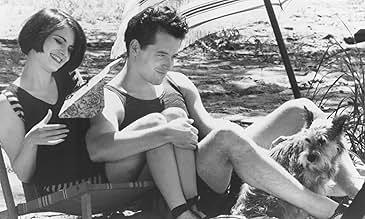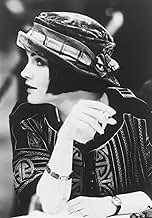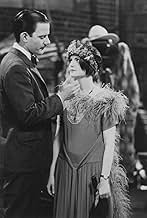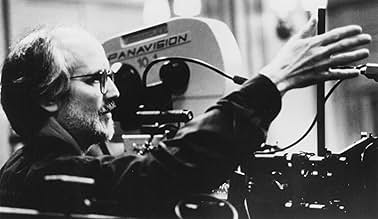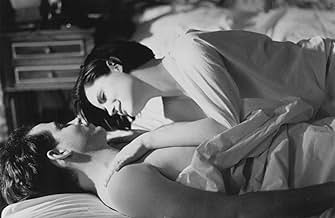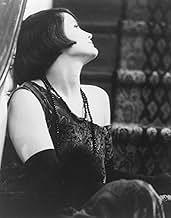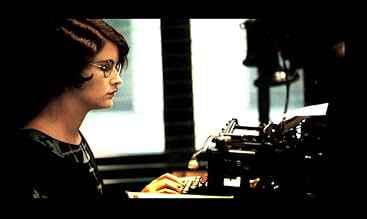IMDb RATING
6.4/10
5.1K
YOUR RATING
Dorothy Parker remembers the heyday of the Algonquin Round Table, a circle of friends whose barbed wit, like hers, was fueled by alcohol and flirted with despair.Dorothy Parker remembers the heyday of the Algonquin Round Table, a circle of friends whose barbed wit, like hers, was fueled by alcohol and flirted with despair.Dorothy Parker remembers the heyday of the Algonquin Round Table, a circle of friends whose barbed wit, like hers, was fueled by alcohol and flirted with despair.
- Director
- Writers
- Stars
- Awards
- 2 wins & 8 nominations total
James Le Gros
- Deems Taylor
- (as James LeGros)
- Director
- Writers
- All cast & crew
- Production, box office & more at IMDbPro
Featured reviews
Towards the end of her career, Dorothy Parker remembers the past days when she was part of the Algoquin Round Table, a group of friends who shared interests in the arts, drink and witty barbs at each others' expense. However behind the wit she has a lot of hurt and the story follows her through broken relationships and lost happiness.
I have seen this film several times but am only writing a review of it now. It always strikes me as being a very worthy film that is `good' and should be appreciated. But, this doesn't make it an easy film to access or watch. On the surface the overlapping dialogue and quick wit makes for a film hat could be accepted several ways. I was stuck in the middle. At once I felt that these people were pompous and condescending but then also felt that they were witty people and clever! The same with Parker herself at times she was a good character but then at others she was mysterious and very hard to understand.
I suppose this is to the film's credit that it never paints it's subjects in one colour there is room for interpretation. The one thing that struck me (me who uses a lot of sarcasm) is how much hurt was often put behind the barbs. As one character says, she never talks deeply with any of her friends and never gets beyond the next barbed remark. The fact that her life slides the way it does shows the danger in this. However the film does still allow the brighter side of her life to come out as well so that it isn't al gloom. This still doesn't make it easy watching there is no one central narrative other than Parker herself. This made it feel a little free floating and aimless and it occasionally felt as hollow and pointless as the quick wit shared by unhappy people around the table.
The cast is pretty good. Leigh does occasionally come over as a woman giving an impression rather than a performance but she does manage to seem more natural when talking rather than quoting. The support cast is made up of quite a few B-grade stars (of quality and some not) and they all give good account of themselves. Broderick, Gallagher, McCarthy, Taylor and Tucci are among the cast but really it is Leigh's film to win or lose.
Overall this is a classy film. The direction and sets really get the period right and film feels good. However at times it seems aimless and much of the film is actually pretty depressing stuff. I took the warning from it of opening up rather than trying to be a smarta*se all the time, but I'm not sure if that was what it was saying. The cast do well and Leigh makes a good Mrs Parker despite just stopping short of out and out impersonation.
I have seen this film several times but am only writing a review of it now. It always strikes me as being a very worthy film that is `good' and should be appreciated. But, this doesn't make it an easy film to access or watch. On the surface the overlapping dialogue and quick wit makes for a film hat could be accepted several ways. I was stuck in the middle. At once I felt that these people were pompous and condescending but then also felt that they were witty people and clever! The same with Parker herself at times she was a good character but then at others she was mysterious and very hard to understand.
I suppose this is to the film's credit that it never paints it's subjects in one colour there is room for interpretation. The one thing that struck me (me who uses a lot of sarcasm) is how much hurt was often put behind the barbs. As one character says, she never talks deeply with any of her friends and never gets beyond the next barbed remark. The fact that her life slides the way it does shows the danger in this. However the film does still allow the brighter side of her life to come out as well so that it isn't al gloom. This still doesn't make it easy watching there is no one central narrative other than Parker herself. This made it feel a little free floating and aimless and it occasionally felt as hollow and pointless as the quick wit shared by unhappy people around the table.
The cast is pretty good. Leigh does occasionally come over as a woman giving an impression rather than a performance but she does manage to seem more natural when talking rather than quoting. The support cast is made up of quite a few B-grade stars (of quality and some not) and they all give good account of themselves. Broderick, Gallagher, McCarthy, Taylor and Tucci are among the cast but really it is Leigh's film to win or lose.
Overall this is a classy film. The direction and sets really get the period right and film feels good. However at times it seems aimless and much of the film is actually pretty depressing stuff. I took the warning from it of opening up rather than trying to be a smarta*se all the time, but I'm not sure if that was what it was saying. The cast do well and Leigh makes a good Mrs Parker despite just stopping short of out and out impersonation.
I found this movie totally enjoyable from start to finish. Maybe because Jennifer Jason Leigh is one of the most superb actresses of our time (and of course ignored!!!). Or maybe because I love period pieces with lavish attention to detail in the costumes and production designing. Or maybe because I am always entertained by true stories of humanity. I think in this movie's case, it is all three. This is another portrait of the dark side of fame. Leigh did a wonderful job being Mrs. Dorothy Parker, a 1920s poet and magazine writer who drank (during prohibition New York) and caroused with a large, mouthy group of professionals in the writing and stage business. It's easy for anyone to relate to the lonliness Mrs. Parker feels in this boisterous "circle" of shallow, back-stabbing people. In spite of her gift for smooth, haunting, beautiful poetry (much of it recited in this movie), Mrs. Parker is not happy or fulfilled. Rather she is misunderstood, isolated and self-depreciating. She ends up losing a job over salary disputes, losing her husband to alcohol, and falling deeply and hopelessly in love with the married Charles McArthur (Matthew Broderick), who impregnates and betrays her. Mrs. Parker's only comfort in life is the friendship she has with Bob Benchley (an excellent Campbell Scott). Leigh, speaking with a facinating accent, brings sadness and cynicism to Mrs Parker with perfection.
I am a fan of many of the writers who flit in and out of this movie, but I confess I don't know much about their personal lives and habits (except perhaps for Benchley, and Thurber who is only barely mentioned in this film). This film gives the viewer a good sense of what it must have been like to be part of the wildly creative crew that surrounded the legendary Algonquin Round Table, but a very confused picture of Dorothy Parker's life. Only someone who already knows her story, and can keep her various husbands and lovers in order, can piece this mish-mash together. And none of the performers are strong enough to seem like anything more than walk-ons dressed as famous people. (The "gang" scenes work because of the fast pacing; the movie drags when we spend time with the individuals.) According to comments recorded here, Miss Leigh is doing a good vocal impression of Dorothy Parker. Maybe so (I've never heard Parker), but Leigh's delivery is so totally annoying that it's enough to drive the AUDIENCE to suicide. Is she trying to do Hepburn on downers? Sometimes her mannered accent veers toward Transylvanian.
Throughout the movie, Parker herself denigrates her little "doodad" poems, but that's all the film offers us of her creative output. We never really find out about the contents of her books and plays, and how she ended up in Hollywood (and what she wrote there). After a few of her doggerel verses, they become trite. I began to wonder if people think these poems are funny because they know they're SUPPOSED to be funny.
I'm sure there's probably a good movie in Mrs. Parker's life, but I don't think this is it.
Throughout the movie, Parker herself denigrates her little "doodad" poems, but that's all the film offers us of her creative output. We never really find out about the contents of her books and plays, and how she ended up in Hollywood (and what she wrote there). After a few of her doggerel verses, they become trite. I began to wonder if people think these poems are funny because they know they're SUPPOSED to be funny.
I'm sure there's probably a good movie in Mrs. Parker's life, but I don't think this is it.
While watching this film last night on IFC, I found myself appreciating the social, historical and artistic subject matter. Despite Mrs. Parker's obvious and overwhelming psychological dysfunctions, I felt this was a genuine "true to life" expression of one participant's subjective experiences. This was a unique, if not quite legendary, circle of literary talent -- certainly deserving of serious cinematic treatment such as this.
BUT....
There was another side to the story -- a healthier, less appalling, less depressing side. To discover "the rest of the story", I highly recommend Harpo Marx' autobiography "Harpo Speaks". Although Harpo also recalls the scathing insults and practical jokes that were a central part of the story of this Round Table group, his book relates a number of hugely funny and sometimes heart-warming scenes that indicate that at least some of these people truly cared for each other and expressed strong positive feelings in many different settings. In short, Harpo's stories (e.g. several "croquet fanatic" episodes) offer a telling comedic counterpoint to Mrs. Parker's almost continually cynical and self-pitying pathos. Read Harpo's book to balance out the negative. You'll be glad you did.
BUT....
There was another side to the story -- a healthier, less appalling, less depressing side. To discover "the rest of the story", I highly recommend Harpo Marx' autobiography "Harpo Speaks". Although Harpo also recalls the scathing insults and practical jokes that were a central part of the story of this Round Table group, his book relates a number of hugely funny and sometimes heart-warming scenes that indicate that at least some of these people truly cared for each other and expressed strong positive feelings in many different settings. In short, Harpo's stories (e.g. several "croquet fanatic" episodes) offer a telling comedic counterpoint to Mrs. Parker's almost continually cynical and self-pitying pathos. Read Harpo's book to balance out the negative. You'll be glad you did.
1920s poet and satirist Dorothy Parker, married to a morphine-addicted ex-soldier and recently fired as a writer for Vanity Fair, goes through a succession of men and magazine-published "doo-dads" before gaining a reputation as one of the greatest wits to come out of Depression-era New York City. "Mrs. Parker" is as rich an evocation of '20s Manhattan as we're likely to get today, and yet one wishes co-screenwriter and director Alan Rudolph would offer us more--or, at least, spring some surprises on us. There are morsels of splendorous chatter amongst the haves and have-nots of the literary world, but not enough to make a satisfying meal. Hollywood beckoned Dorothy Parker, but the experience left her depressed, as did life in general, which may be why she talked in a world-weary, dry-arch style which gave the impression of a woman with many disappointments in her closet. This is fascinating subject matter for the movies, but Rudolph barely dramatizes the material at all; he's so closed off from what's happening on the screen, many sequences plod by without any directorial nourishment. Certainly the large and interestingly cast group of actors on display are worth watching, though there are possibly too many real-life personalities rushing by us, everyone nonchalantly vying for time. Parker's "goodbye cruel war" attitude did not back her up in the end and, living until the year 1967, she survived most of her Algonquin Round Table cohorts. The film does not sentimentalize her or put her up on a pedestal, but neither does it help us to understand the tragedienne living beyond the wincing prose and words of woe. Jennifer Jason Leigh's portrayal divided the critics in 1994, yet she's definitely on to something special here. With a more incisive treatment, she may have delivered a true triumph. **1/2 from ****
Did you know
- TriviaThe founding of the "New Yorker" magazine is a subplot in this movie; Wallace Shawn's father, William, was, for many years, editor-in-chief of "The New Yorker".
- Quotes
Dorothy Parker: Razors pain you, rivers are damp, acids stain you, drugs cause cramp. Guns aren't lawful, nooses give, gas smells awful; you might as well live.
- ConnectionsFeatured in Would You Kindly Direct Me to Hell?: The Infamous Dorothy Parker (1994)
- How long is Mrs. Parker and the Vicious Circle?Powered by Alexa
Details
- Release date
- Countries of origin
- Language
- Also known as
- Mrs. Parker and Mr. Benchley
- Filming locations
- Production companies
- See more company credits at IMDbPro
Box office
- Budget
- $7,000,000 (estimated)
- Gross US & Canada
- $2,144,667
- Opening weekend US & Canada
- $74,512
- Nov 27, 1994
- Gross worldwide
- $2,144,667
- Runtime
- 2h 5m(125 min)
- Color
- Sound mix
- Aspect ratio
- 2.39 : 1
Contribute to this page
Suggest an edit or add missing content


